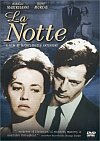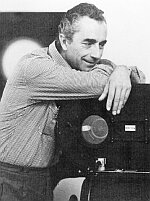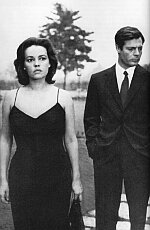La Notte

On September 29th, the great Italian filmmaker Michelangelo Antonioni celebrates his 90th birthday. His universally acclaimed films, L’Avventura, La Notte, Red Desert, L’Eclisse, Blow Up, Zabriski Point, and others, have been praised and dammed by film critics around the world. But everyone agrees that Antonioni is a film genius, an artist who has influenced filmmakers and the contemporary cinema around the world. I thought it would be appropriate to pay homage to Antonioni during this wonderful celebration of his life. To me, he is the Maestro of contemporary cinema.
Back in the 60’s, I had read about Michaelangelo Antonioni, heard about him, but had never seen a film of his until I saw La Notte. As I sat in the theater and watched those images unfolding in front of me, I had an amazing and deep-seated emotional response. It just hit me in the gut. For days, certain images from the film haunted me, always a sure sign, I knew, that there was something important for me to learn.
As I went back over the film in my mind, I began to understand that it worked on two different levels. One level is the ordinary, visual surface level, which portrayed those seemingly ordinary events that make up our day to day existence. The other level, deeper and far richer, occurs below the surface details, and deals with the emotional action and interaction between the two main characters. It was this second level, the emotional state, that revealed the true nature of what the characters are thinking and feeling. In that regards, I saw that what was left unsaid became far more important that what was said.
At the first viewing of La Notte, I only sensed this emotional state; I had no words to express it, only these vague, lingering images. Seeing it a second time, I felt that maybe Antonioni had uncovered some kind of new visual language, and used his images to create an emotional response, something felt, not spoken. Later, I would discover this subterranean emotional level would be known as subtext, something I had known and practiced during my acting career.
In the film, Giovanni (Marcello Mastroianni) and Lidia (Jeanne Moreau) have lived in Milan during their ten years of marriage. Giovanni is a successful novelist whose new book has just been published, but emotionally, he is in a crisis. He feels his best years are behind him, and he”™s stuck in the meaninglessness of writing a new novel. Lidia feels empty, telling Giovanni that she no longer feels the same toward him.
 It took me several viewings to understand that one of Antonioni’s greatest achievements in illustrating characters is that they see themselves in each other. Visiting their dying friend in the hospital they ride in the elevator, and carefully avoid looking at each other. Two people, separate, but together, without emotional bonds of sympathy or encouragement. Their dying friend tells Giovanni and Lidia that being in the hospital has given him time to think and it’s only now that he understands that he is a person who “lacks the courage to get to the bottom of things.” In a way, he could be speaking for Giovanni as both sense they are seeing a reflection of their own lives.
It took me several viewings to understand that one of Antonioni’s greatest achievements in illustrating characters is that they see themselves in each other. Visiting their dying friend in the hospital they ride in the elevator, and carefully avoid looking at each other. Two people, separate, but together, without emotional bonds of sympathy or encouragement. Their dying friend tells Giovanni and Lidia that being in the hospital has given him time to think and it’s only now that he understands that he is a person who “lacks the courage to get to the bottom of things.” In a way, he could be speaking for Giovanni as both sense they are seeing a reflection of their own lives.
Antonioni demonstrates the power of silence in film, and shows how it can be much more effective than words. The chasm in their marriage is shown visually, through their behavior.
When Giovanni and Lidia leave the hospital and take a long drive to a party celebrating the publication of his new book, we sense the emotional distance between them. They drive in absolute silence. Once again, I saw that Antonioni uses this little scene of driving in the car to illustrate their isolation from each other.
At the publication party, Lidia, looking and feeling like the outsider, leaves and wanders through the city. We see what she sees, and sense her alienation from her husband and herself. The simple stroll reveals the emotional state of the character and I saw that the empty landscapes of the city reveals her state of mind. So simple, yet so rich, I responded on both an emotional and intellectual level.
Many critics and reviewers did not understand this long walk. To me, it represents another aspect of the journey into insight and clarity. Everything in La Notte is part of a journey: a journey to hope, a journey to despair, a journey of fulfillment, a journey seeking an emotional connection to other people, a journey to freedom, a journey to isolation, the journey from night to day. After all, the journey from night to day, from darkness to light, from ignorance to knowledge, is all part of the journey of life.
 Later, at an evening party given in honor of Giovanni by a wealthy industrialist, Lidia is tempted by a rich playboy, while Giovanni is tempted by Valentina (Monica Vitti), the daughter of their host. When it begins to rain, many of the partygoers seek a diversion by leaping into the pool. Giovanni and Valentina share some pleasant moments together, and like many strangers, share their most intimate thoughts. He tells her “I believe now that I’m no longer capable of writing. I know what to write but not how to write it.” Like many of Antonioni’s characters, Giovanni’s personal life is reflected in his inability to work; he is what he does. It’s not his ideas and convictions that have been lost, but the force, the energy, and the inner fire to create a work of art, which has been lost. Ideas are part of his make-up; they may change, evolve, come and go, but they are never lost. It’s in the physical act of producing his work that Giovanni has become powerless.
Later, at an evening party given in honor of Giovanni by a wealthy industrialist, Lidia is tempted by a rich playboy, while Giovanni is tempted by Valentina (Monica Vitti), the daughter of their host. When it begins to rain, many of the partygoers seek a diversion by leaping into the pool. Giovanni and Valentina share some pleasant moments together, and like many strangers, share their most intimate thoughts. He tells her “I believe now that I’m no longer capable of writing. I know what to write but not how to write it.” Like many of Antonioni’s characters, Giovanni’s personal life is reflected in his inability to work; he is what he does. It’s not his ideas and convictions that have been lost, but the force, the energy, and the inner fire to create a work of art, which has been lost. Ideas are part of his make-up; they may change, evolve, come and go, but they are never lost. It’s in the physical act of producing his work that Giovanni has become powerless.
Lidia telephones the hospital to find out how their friend is doing, only to learn he has just died. When she goes to tell Giovanni, she sees him kissing Valentina, and turns away.
They leave the party in silence, and walk out into the cold, gray light of dawn, and that’s when she tells him of their friend’s death. She says that “if I want to die, it’s because I no longer love you. That’s the reason for my despair. I would like to be old already, to have devoted my whole life to you. I don’t want to exist any more because I can’t love you.” And, he replies:”I have given you nothing, I amount to nothing. I have wasted and I’m still wasting my life, like an idiot, taking without giving anything or giving too little in exchange. It’s strange that only today did I realize that what we give to others comes back to ourselves.”
At the end of the film, sitting in the gray light of dawn at a deserted golf course, she reads him an old love letter, moving, poetic, from the heart. When he asks, “who wrote it,” she looks at him for a long moment, then confides “you did.” A little overstated, true, but it allows us to realize the depth of his despair. He turns to her, and tries to force his love upon her, trying to recapture their lost passion. As day breaks, the script reads, “A sort of animal passion, a memory of that which was and which will never be again, grips them.” Fade out.
I had no words, or language, about what I felt at the time I first saw La Notte, but as I studied the film over and over again, I grasped that something new was at work here, something profound, a different way of telling stories in pictures. Antonioni seemed to tell his stories internally, revealing the language of the heart through visual images.
 A lot of people did not like La Notte because they claimed “nothing really happens;” there is no plot, no action and it’s way too long. Some critics asserted the film is simply an “empty testament of modern life,” not even a “slice of life,” and they viewed Antonioni as a filmmaker who is too internal, focusing on what does not happen, rather than on what could happen. Whatever that means. Like Rashomon, everyone saw something different.
A lot of people did not like La Notte because they claimed “nothing really happens;” there is no plot, no action and it’s way too long. Some critics asserted the film is simply an “empty testament of modern life,” not even a “slice of life,” and they viewed Antonioni as a filmmaker who is too internal, focusing on what does not happen, rather than on what could happen. Whatever that means. Like Rashomon, everyone saw something different.
My response to the film had been so powerful that I kept dreaming about it, jotting notes down in my journal. Looking back, I think what I responded to the most was how I identified with the characters and their search for meaning in life.
Seeing La Notte, I discovered a visual metaphor about the search for love. As I became more familiar with some of Antonioni’s later films I saw that many of his movies deal with this theme. The questions he raises are simple, yet profound; how does a person live in the modern world, in a world of change, cynicism and technology, with integrity, values, faith and love.
The emotional landscape that Antonioni explores, whether in L’Avventura, La Notte, Red Desert, Eclipse, Zabriskie Point, or his last film, Beyond the Clouds, all deal with this same theme. F. Scott Fitzgerald once wrote that we only write one or two stories during our lives; it doesn’t matter how many books we write, or how many movies we make, we end up exploring the same themes over and over again.


Comments are closed.